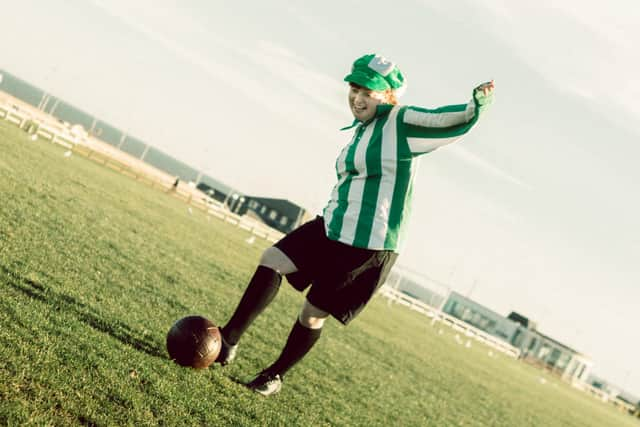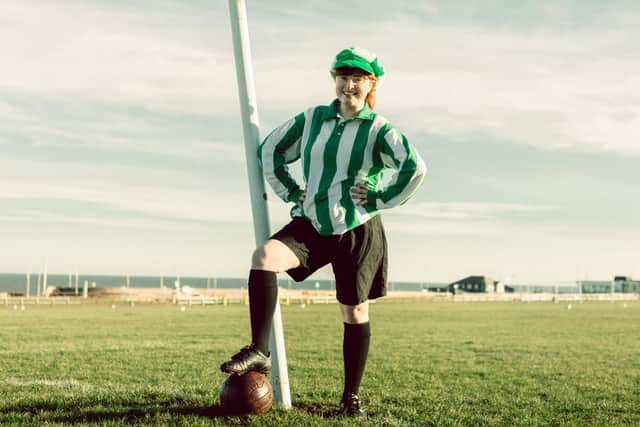International Women's Day event to celebrate footballing achievements of 'Wor Bella' and others
and live on Freeview channel 276
The event, called International Women’s Day Celebration, will celebrate women's achievements on the football pitch from the WW1 munitionettes to the present day.
Co-ordinated by South Shields-based internationally produced playwright Ed Waugh, the celebration will incorporate excepts from his new play called Wor Bella, trailer films and talks by representatives of women's groups in the region.
Advertisement
Hide AdAdvertisement
Hide AdEd said: "It generally comes as a surprise to people that there were women's football matches during WW1.


"Not only that, tens of thousands of people turned out to watch these selfless "munitionettes" raise money for injured soldiers, widows and orphans.
"The failure of the government to provide for soldiers being slaughtered and maimed on the Western Front meant working class people had to fend for themselves during the crisis."
Initially, collections were made outside cinemas, churches, workplaces, theatres - anywhere people assembled.
Advertisement
Hide AdAdvertisement
Hide Ad"In a time of acute austerity it was difficult to ask people to continuously cough up their limited cash," explained Ed.


He continued: "In late 1917 football matches started to be organized for a bit of fun and to give people entertainment.
"Initially it was injured soldiers playing women from the "munitions factories" - this term applied to any workplace with a Ministry of Munitions contract. It included shipyards, armaments and rope making factories, chemical plants, steel mills, etc.
"Matches were played locally at Westoe while Palmers of Jarrow had a crack women's football team based on the shipyards there."
Advertisement
Hide AdAdvertisement
Hide AdThe football story has its roots in 1916 when around three-quarters of a million men were slaughtered on the battlefields of France and Belgium in under 18 months. To keep the slaughter going, conscription for men was introduced in 1916.
This left an industrial void, and women flocked into the workplaces to save the WW1 war effort.
In the first eight months of the war just two million artillery shells had been sent to France - by 1918 a million a day were being fired by the British army. The people behind this turnaround were the heroic munitionettes who worked a 60-hour week in dangerous, unsafe conditions.
According to government figures, by the end of 1916 more than 897,000 women had filled the jobs vacated by men, such as in heavy industry, bus conductors, clerical assistants, postal workers etc.
Advertisement
Hide AdAdvertisement
Hide AdEd, continued: "While the munitionettes only received half the wages of men, for the first time ever, a cohort of single women had money in their pocket, buying into middle class fashions, wearing trousers and even visiting pubs without a male chaperone!
"Bear in mind, pre-WW1 a big proportion of working class women from the North East and beyond went into domestic servitude for pittance pay when they left school or they worked as shop assistants etc until they got married; then they were expected to have children and look after the family in the confines of the home.
"The feisty munitionettes caused an uproar among conservative layers. The term "defeminisation" was often branded about."
By the end of the war, in November 1918, there were just over 1 million working women. Of these, 700,000 were employed in the munitions industry and 80 per cent of all weapons were produced by these working class women
Advertisement
Hide AdAdvertisement
Hide AdIf they could do men's jobs, then women could also play sports that were supposed to be the preserve of men, especially as professional football was banned in 1915.
From joining in with men during dinner time breaks, to playing organised matches the progress was rapid. Hundreds of teams formed spontaneously throughout the country - often 2,000-3,000 people paid their 6d (£1.50 today) to be entertained.
But things quickly became more serious. The women trained and dedicated their spare time to developing all-female teams that could compete against each other.
In the North East, dozens of teams were formed in Middlesbrough, North Yorkshire (Skinningrove), Darlington, Hartlepool and County Durham, Sunderland, South Tyneside, Newcastle and Gateshead
Advertisement
Hide AdAdvertisement
Hide AdBlyth Spartans Ladies in South East Northumberland became local and regional heroes, playing in front of an average gate of 4,000. The Blyth women worked at Blyth docks unloading spent shells from France, and the biggest star was Bella Reay, their magnificent centre forward who notched 133 goals in 30 unbeaten games.
"Wor Bella" was "the Alan Shearer of her day".
Bella and Blyth Spartans Ladies went on to win the inaugural 1918 Munitionettes Cup against Bolckow Vaughan of Middlesbrough in front of 22,000 people at Ayresome Park (the then home ground of Middlesbrough FC). Jarrow Palmers won the cup in 1919.
Wor Bella is about women's football as seen through the eyes of Bella Reay (played by Lauren Waine) and it comes to The Westovian Theatre, South Shields on Saturday, April 2 (2.30pm and 7.30pm).
The International Women’s Day Celebration, takes place on Sunday, March 6, at the Market Place venue in South Shields town centre from 1pm to 3pm.
For booking details visit:
https://theworduk.org/whats-on/international-womens-day-celebration/
Wor Bella, which is supported by Arts Council England, tours the North East in March /April. www.worbella.co.uk